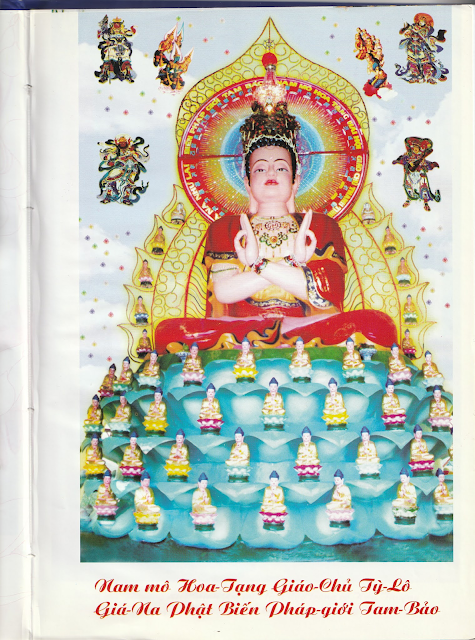The Flower Ornament Scripture
A Translation of the Avatamsaka Sutra
Thomas Cleary
BOOK
SIXTEEN
16. Religious Practice
THEN THE GODLING Right Mindfulness said to the
enlightening being Truth Wisdom,
"In all worlds, enlightening beings, fol lowing the teaching of the
Enlightened Ones, dye their clothing and leave home to become mendicants : how
can they attain purity of religious practice, and from the state of
enlightening reach the path of unexcelled enlightenment?"
Truth Wisdom said, "Great enlightening beings,
when performing religious practice, should attentively contemplate ten things
objectively: the body, physical action, speech, verbal action, mind, mental
action, Buddha, the Teaching, the religious
community, and the precepts. They
should contemplate in this way: Is the body religious practice? And so on, down
to : Arc precepts religious practice? If the body were religious practice, then
religious practice would be not good, it
would not be the true teaching, it would be defiled, it would be impure, it would be foul, it would be unclean, it
would be disgusting, it would be intractable, it would be defined, it would be
a corpse, it would be a mass of
microbes. If physical action were religious practice, then reli gious practice
would be walking, standing, sitting, lying down, look ing around, up and down.
If speech were religious practice, then religious practice would be sound and
breath, chest, tongue, lips, exhalation and inhalation, constriction and relaxation,
high and low, clear and unclear. If verbal activity were religious practice,
then reli gious practice would be greetings, summary explanations, extensive
explanations, metaphorical explanations, direct explanations, praise,
criticism, definitions, explanations accommodated to conventions, clear
explanations. If the mind were religious practice, then religious practice
would be consideration and pondering, discrimination, various discrimi
nations, conception, various
conceptions, thought, various thoughts,
acts of illusion and dreams. If mental activity were religious practice, then
religious practice would be ideas, cold and heat, hunger and thirst, pain and
pleasure, sorrow and joy. If Buddha is religious practice, is material form to
be considered Buddha? Is sensation Buddha? Is concep tion Buddha? Is action
Buddha? Arc spiritual powers Buddha? Arc
401
works Buddha? Are resulting consequences Buddha? If
the Teaching is religious practice, is extinction the Teaching? Is nirvana the
Teaching? Is nonbirth the Teaching? Is nonorigination the Teaching? Is
inexplica bility the Teaching? Is nondiscrimination the Teaching? Is nonaction
the Teaching? Is nonconjunction the Teaching? If the Community is reli gious p
ractice, is heading for stream-entering the Community? Is the fruit of
stream-entering the Community? Is heading for
the state of on ce-returner the
Community? Is the fruit of once-returner the Community? Is heading for the
state of nonrcturner the Community? Is the fruit of nonrcturner the Community?
Is heading for sainthood the Community? Is the fruit of sainthood the
Community? A re those with the three super-knowledges the Community? Are those
with the six paranormal powers the Community? If the precepts are religious
practice, is the ordination altar the precepts? Is asking about purity the
precepts? Is teaching proper manners the p recepts ? Is the threefold
repetition the precepts? Is the instructor the precepts? Is the tutor the
precepts? Is shaving o ff the hair the precepts? Is putting on the monastic
garb the precepts? Is begging the precepts? Is right livelihood the precepts?
"Having contemplated thus, having no attachment
to the body, no
clinging to practice, no dwelling on doctrine, the
past gone, the future not yet arrived, the present empty, there is no doer, no
receiver of consequences; this time doesn't move, another time doesn't shift-what thing is
therein to be called religious practice? Where docs religious practice come
from? Where is it? Who is the body? By whom is it performed? Docs it exist?
Does it not exist? Is it form? Is it not form? Is it sensation? Is it not
sensation? Is it conception? Is it not conception? Is it action? Is it not
action? Is it consciousness? Is it not consciousness? Contemplating in this
way, because the reality of religious practice cannot be apprehended, because
the things of past, present, and future are all empty, because the intellect has no attachment,
because the mind has no obstruction, because the sphere of operation is
nondual, because expedient means are free, because of acceptance of formless truth,
because of contemplation of formless truth, because of knowing the Buddha's
teaching is equanimous, because of ful filling all qualities of Buddhahood, is
such practice called pure religious practice.
"Ten things should also be cultivated:
knowledge of what is so and what is not; knowledge of past, present, and future
consequences of actions; knowledge of all meditations, liberations, and
concentrations; knowl edge of superiority and inferiority of facul ties;
knowledge of all
kinds of understandings; knowledge of all kinds of
realms; knowledge of where all paths lead; unhindered clairvoyance; unhindered
knowl edge of past lives; knowledge of the eternal cancellation of habit
energy. Contemplating each of these ten powers of the enlightened, in each power
are innumerable meanings; one should ask about them, and a fter having heard
about them should arouse a mind of great kindness and compassion and observe
sentient beings without abandoning them,
Religious Practice 403
reflect on the teachings unceasingly, carry out
superlative deeds without seeking rewards, comprehend that objects arc like
dreams, like illusions, like reflections, like echoes, and like magical
productions. If enlighten ing beings can unite with such contemplations, they
will not entertain a dualistic understanding of things and all enlightening
teachings will become evident to them:
at the time of their first determination they will immediately attain com plete
perfect enlightenment, will know all things arc the mind's own nature, and will perfect the body of wisdom and
understand without relying on another. "

Comments
Post a Comment